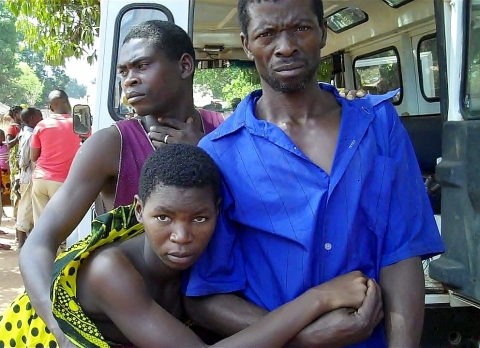
When we saw her outside the health clinic, Fatima Namangana was contorted with pain and so sick she might not have survived the night. (Photo by Mercedes Sayagues)
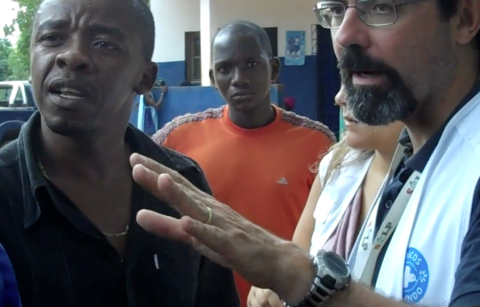
Click here to watch raw video of the scene outside the Ngapa health clinic. (Video by Mercedes Sayagues)
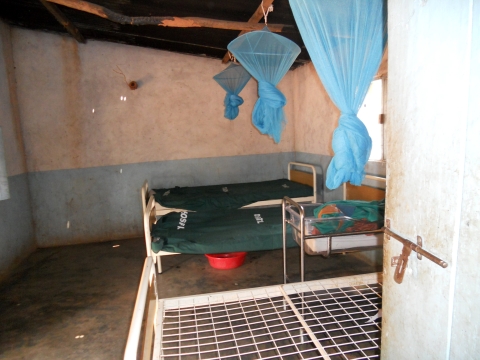
The maternity ward in Ngapa is stark, but there are mosquito nets. (Photo by Mercedes Sayagues)
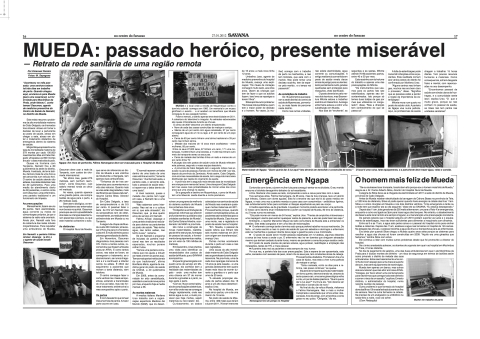
Here is a shot of the two-page spread in the popular weekly newspaper Savana.
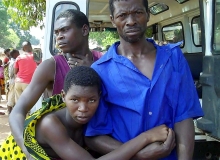
When we saw her outside the health clinic, Fatima Namangana was contorted with pain and so sick she might not have survived the night. (Photo by Mercedes Sayagues)
Three weeks ago, Fatima Namangana, 26, mother of three young children, had a miscarriage that turned septic. She was in excruciating pain. This was the third time she had come to the clinic in Ngapa, and again the midwife -- there are no doctors here -- sent her home with pills. The mild antibiotics are not strong enough to fight the infection crawling through Fatima's body.
[video: 43303, right, medium]Urso realizes the gravity of the situation. Peritonitis could set in any time. Our car is the only one available and must immediately take Namangana to Mueda hospital, 50 miles, or two hours, away on a bad road.
“She could die in less than 24 hours,” explains Urso. “She needs intravenous ampicillin and a uterine evacuation to extract any placenta that remains, and she cannot get those here.” Gorka Solanas, coordinator of Medicos del Mundo, goes into the clinic to get a mattress. There, he finds a woman in her 40s with terminal AIDS, in bed. She must also go to Mueda. It took a small army of men to load the mattresses and then the patients into the car. But finally, off they went in our makeshift ambulance - a driver, a health technician and two critically ill women.
Meanwhile, Mueda community radio reporter Marcelino Miguel interviews villagers. They are vocal, they are angry and they have a list of complaints:
The nurse starts late and closes early because he prefers to work in his field (machamba). In fact, a handwritten sign in the clinic says on Saturday and Sunday the nurse is at the machamba and anybody who needs him must provide petrol for his motorcycle.
The clinic serves 10,000 people spread in 12 villages, some three hours away on foot. The nurse will not see patients who are late even if they have walked for three hours, even if they missed the consultation because he left early.
The clinic needs solar panels, potable water, rehabilitation and extension of facilities, HIV tests and more staff.
The midwife mistreats patients and is always in a bad mood.

When we saw her outside the health clinic, Fatima Namangana was contorted with pain and so sick she might not have survived the night. (Photo by Mercedes Sayagues)
“I am tired. I count the days until I retire. I can’t go on,” she sighs.
She throws open the door of the maternity house: Oven-hot, it is crumbling with roof beams near the breaking point, an old, battered gynecological bed with stirrups and a couple of plastic buckets. An ancient baby-weighing scale sits on a shaky chair. “Who would want to give birth here?” she mutters. “This should be razed and build a new one.”
At the end of the day, back in Mueda, we visit Fatima. She is not the sweaty, contorted and scared woman we saw earlier: rested, safe, ampicillin dripping through her wrist.
“Thank you,” she says. “You were lucky,” says the nurse.

When we saw her outside the health clinic, Fatima Namangana was contorted with pain and so sick she might not have survived the night. (Photo by Mercedes Sayagues)